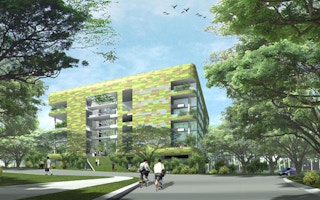Industrial estates developer JTC Corporation opened on Thursday the first property in Singapore’s first green business park.
To continue reading, subscribe to Eco‑Business.
There's something for everyone. We offer a range of subscription plans.
- Access our stories and receive our Insights Weekly newsletter with the free EB Member plan.
- Unlock unlimited access to our content and archive with EB Circle.
- Publish your content with EB Premium.
Called the CleanTech One, the six-storey two-towered building with over 37,000 square metres of space will house various local and international organisations to create a diverse hub for clean technology.
The green ‘complex within a complex’ is part of a concerted effort between JTC and the national government to drive the clean technology industry in Singapore and encourage more businesses to embrace sustainability.
Ministry for Trade and Industry Mr Lim Hng Kiang, who led the launch, said, “The issue of environmental sustainability is increasingly a key concern of many governments and companies. This has spurred the growth of the global cleantech market, which now stands at around US$1 trillion annually.”
“
Singapore is being positioned as ‘the Asian epicentre’ where firms can develop and commercialise green technology solutions.
Singapore has identified the clean energy, water and environment industries as key growth areas. The expected GDP (gross domestic product) contribution of these industries is worth S$3.4 billion (or US$2.6 billion), he added.
CleanTech One, and the entire CleanTech Park, will help in this regard, said Yeoh Keat Chuan, managing director of the Singapore Economic Development Board. He explained that together with JTC, they are positioning the country to be ‘the Asian epicentre’ where firms can develop and commercialise green technology solutions.
CleanTech One is listed as a Green Mark Platinum building, which is the highest rating classification in Singapore’s green building certification scheme. According to JTC, the building, which cost $87 million to construct, has several environmental features. Surbana International Consultants designed the towers.
CleanTech One has an east-west facing façade to maximise solar orientation, while abundant greenery reduces heat gain. Solar panels are also installed on the roof and energy-efficient lighting is installed throughout the building. Among other features, there is also a one-megawatt fuel cell plant supplying renewable energy, a bio-digester to eliminate food waste, and a dehumidification chiller to provide a pleasant office atmosphere.
The other important draw for the clean tech hub is its location. The CleanTech Park is adjacent to Nanyang Technological University (NTU), which enables knowledge sharing and promoting partnerships between businesses and the academe.
NTU professor Ng Wun Jern, also the executive director of the Nanyang Environment & Water Research Institute (NEWRI) and a CleanTech One tenant, said, “Having like-minded professionals from academia and businesses under the same roof at CleanTech One is an invaluable opportunity for fruitful collaborative exchanges. These exchanges help to ensure that our pursuit of green solutions stays industry-relevant and practical.”
The Energy Research Institute @ NTU or ERI@N is another NTU research body located at CleanTech One. The Solar Energy Research Institute of Singapore (SERIS) is another similar tenant. They have laboratories on photovoltaic module performance analysis and solar-powered air-conditioning, as well as their SERIS Testing and Certification Lab.
CleanTech One is also located closely to the Jurong Industrial Estate and Tuas, one of the largest manufacturing area in Singapore, said JTC chairman Dr Loo Choon Yong.
So far, 22 organisations have set up in CleanTech One, such as Danish water firm DHI Water and Environment, Sinomem Technology from China, semiconductor company Advantec, thermal systems firm Solid Asia, energy solutions company Diamond Energy, and Japanese carbon fibre producer Toray Industries.
“With all these companies coming together, CleanTech One has become a bustling focal point for more than 800 green-collar workers who are passionate about Singapore’s cleantech future,” Dr Yong remarked.
Dallon Kay, Diamond Energy president said, “JTC’s openness to experimental research work and their willingness to consider the adoption and deployment of new technologies was one of the main reasons that attracted Diamond Energy to relocate its Demand Response Operations Center to CleanTech One. Here, SMEs have the opportunity to partner with world class research institutes to advance their development of cleantech solutions.”










